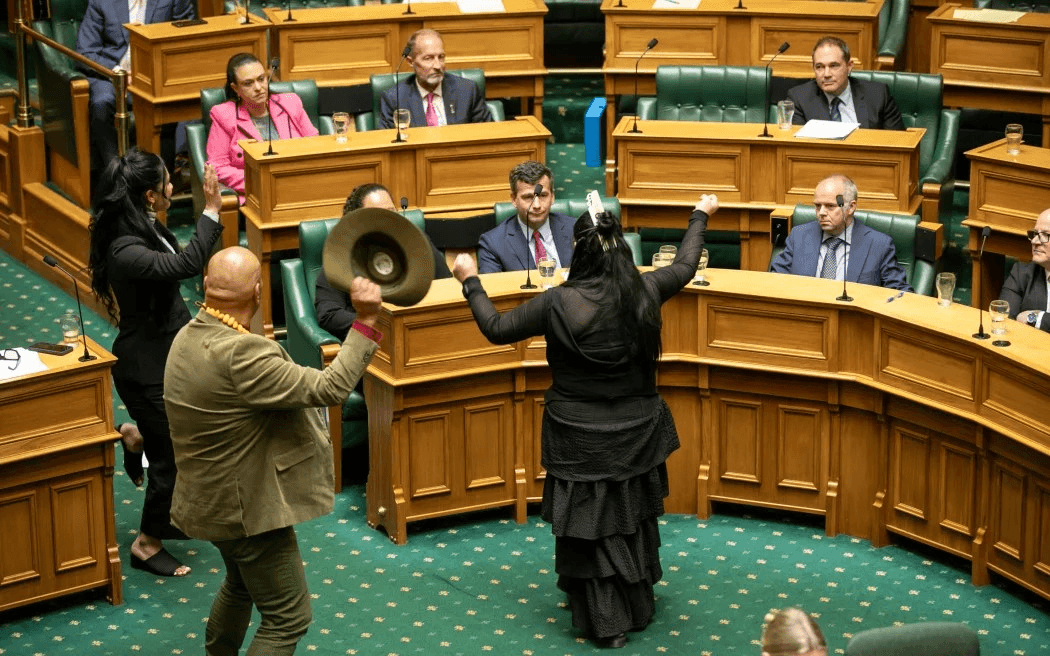A profound strategic blunder comes back to haunt Christopher Luxon.
The mood of panic emanating from the National Party over the last fortnight did not come from nothing. For months a National-Act majority coalition had looked like a done deal. Though they were careful not to appear complacent, it would have been impossible not to be measuring out in the back of their minds the blue and yellow drapes.
Then suddenly a man on a horse appeared on the horizon, talking about rodeos and welcoming followers of any stripes, among them those who go to sleep fretting about public toilets or Klaus Schwab. Winston Peters was in the mix. Christopher Luxon read the runes – or their polls, in fact – and announced they’d call him if necessary. This happened exactly one week before voting booths opened to the population at large. Peters and his NZ First party could not have dreamed of better timing.
The message from National’s leader was this: We do not want to work with Winston Peters but we don’t not want to work with him enough not to work with him. Also, I don’t know him, said Luxon. Also, he might make him prime minister. Wait, no, that was a misspeak.
The polls kept moving in the same direction and the anti-Winston rhetoric ramped up. He was a “worst case scenario”. He could not be trusted. Stop it. John Key was recruited to front a series of messages warning about the perils of a post-election “limbo”. Campaign manager Chris Bishop went further, warning of the “very real possibility” negotiations with Peters would fail and the country would be sent back to the polls for a second election. Such a spectre of instability would be unwelcome at the best of times, not least now, when the country is already, very clearly, sick to the back teeth of a grim, grumpy, lacklustre election.
Bishop, among others, had for a while been bemoaning a fear-mongering, negative campaign. Here, however, he appeared to be issuing a negative message and mongering fear about a National-led government. That can only have fed further into doubts about the breadth and viability of its core tax cut promise.
The messages of the last fortnight might have had an unhinged ring, but the real strategic blunder happened some time ago. The blunder was failure to follow Key’s example and rule out, or even rule in, Winston Peters, but – and this is the critical bit – do it well in advance, so that any embers had extinguished by campaign time. Instead, it happened at the moment when half the country were tuning into politics. The greatest trick Winston Peters ever pulled was Christopher Luxon becoming convinced he didn’t exist.
A Wednesday night poll double feature lays it all out clearly enough. The Reid poll for Newshub is the grimmest for National, putting the party under 35% and the leftwing coalition just four or five seats away from pulling off an impossible comeback. The Verian/1News numbers were less painful, but here, too, the picture was plain: the National-Act-NZ-First government they’ve spent the best part of the last fortnight freaking out in public about is coming soon.
If there was one consolation from both of tonight’s polls it’s that the nightmare scenario – in which NZ First overtakes Act and becomes the senior coalition partner, throwing up another level of fever dream – does not appear, as it did, menacingly, in this morning’s Essential/Guardian poll.
About a million people have voted by now, on day 10 of advance voting. How reliable are the numbers likely to be? Judged on the example of recent elections, pretty close. Below, the poll results from the pair of telly polls in the few days before the last election.
That chart will light up the eyes of Labour loyalists and send a chill down National spines. Last time around, the TV polls understated Labour support by four points, and overrated National by more than five. As with almost everything about that election, however, it's best taken with a spoonful of salt. The turnout was very high and the wheels just kept tumbling off the National campaign under Judith Collins. The circumstances now are different.
More instructive, probably, is the 2017 example, when again the polls were conducted deep into the advance voting period.
Nothing is impossible, but it would take a small miracle, and an unlikely turnout surge, for a Labour-Green-Te Pāti Māori (the original coalition of chaos) to prevail, for National to lose what some have called the coalition of chaos. So even as the right will be wondering how it came to this, any delight on the left is unlikely to last to the end of Saturday night.
The Greens have barely put a foot wrong in a carefully planned campaign and are poised for a record intake of MPs, but they will once again be out of government. Labour has rallied in the last week or so, despite their leader being confined to a hotel room for much of it, and their relief at avoiding further decline is palpable. But however satisfying it might be to sink three-pointers towards the final buzzer, it’s a pyrrhic kind of pleasure when you've collapsed from a record-setting victory to be trailing by so many points.
Follow Gone By Lunchtime on Apple Podcasts, Spotify or wherever you listen to podcasts.





